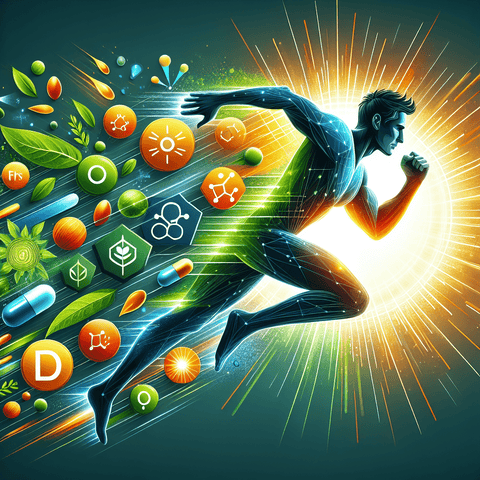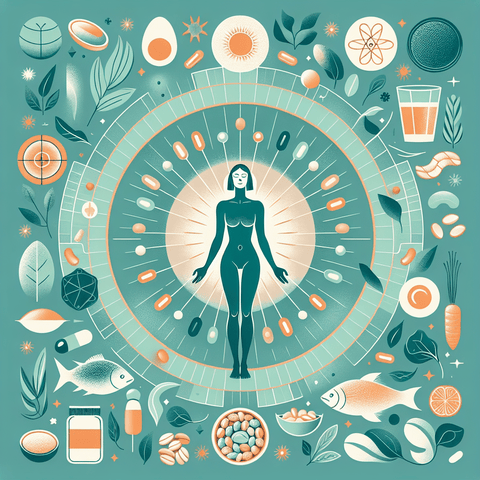Introduction
In the fast-paced rhythm of modern life, maintaining high energy levels throughout the day is more critical than ever. Whether you're juggling a stressful job, managing family responsibilities, or striving to meet fitness goals, sustained energy is key to productivity and well-being. However, many people find themselves feeling fatigued, sluggish, or unfocused, despite getting adequate sleep or consuming ample calories. This disconnect often points to a deeper issue: the body may be lacking essential nutrients — particularly vitamins — that are required for efficient energy production at the cellular level. Vitamins are organic compounds essential for various physiological processes, including converting food into usable energy. Though they don’t provide calories themselves, vitamins act as critical coenzymes and cofactors in metabolic reactions that release energy sustainably. Therefore, a deficiency in even one crucial vitamin can disrupt energy metabolism and lead to persistent tiredness. In this comprehensive guide, we will explore the role vitamins play in energy production, identify the most effective energy-boosting vitamins, and guide you through choosing high-quality supplements that support your vitality. We’ll also look at how to integrate vitamins into a holistic lifestyle plan that leaves you energized all day long. So, which vitamin gives the most energy? Let's find out.Vitamins for Energy: An Introduction to Nutritional Supplements
Many people equate energy with stimulants like caffeine or sugar, which provide temporary boosts but often lead to crashes later. Unlike these quick fixes, vitamins work at the core of your metabolism to support long-lasting energy by aiding in the biochemical processes that convert carbohydrates, proteins, and fats into ATP — the energy currency of your cells. Each vitamin plays a different role in this complex machinery. For instance, B-complex vitamins are involved in numerous energy-yielding metabolism processes. Without them, your body can't effectively transform food into energy. Similarly, magnesium and iron participate as cofactors in enzymatic reactions crucial for energy generation. Energy-related fatigue is a widespread concern that can stem from multiple reasons — inadequate sleep, psychological stress, chronic illness, or more commonly, nutritional deficiencies. A lack of specific vitamins such as B12, vitamin D, or iron can impair oxygen transport, hinder neurological function, or slow mitochondrial activity, all leading to low energy levels. Scientific studies support this link between vitamin deficiencies and fatigue. Research shows that people with suboptimal levels of B vitamins often report tiredness and difficulty concentrating. Fortunately, targeted supplementation can restore balance and help regain natural energy levels. Whether in tablet, capsule, powder, or liquid form, energy-boosting supplements can be a valuable part of a wellness routine when chosen wisely and used consistently. To determine which vitamin gives the most energy, we'll now delve into the top vitamins and nutrients that have a proven track record of supporting recovery from fatigue and enhancing day-to-day vitality.Natural Energy Boosters: Top Vitamins and Nutrients That Naturally Increase Energy Levels
When considering natural energy-boosting compounds, B vitamins top the list — and for good reason. The B-complex vitamins (B1, B2, B3, B5, B6, B7, B9, and B12) are central to cellular metabolism and energy production. Let's explore each briefly: - Vitamin B1 (Thiamine): Helps convert carbohydrates into ATP, essential for nerve and muscle function. - Vitamin B2 (Riboflavin): Plays a critical role in the electron transport chain to produce energy. - Vitamin B3 (Niacin): Assists in DNA repair and is needed for over 400 enzymatic functions, many of which relate to metabolism. - Vitamin B5 (Pantothenic Acid): Required for coenzyme A, important in synthesizing and breaking down fatty acids. - Vitamin B6 (Pyridoxine): Intervenes in amino acid metabolism and neurotransmitter synthesis, both critical for energy and mental clarity. - Vitamin B7 (Biotin): Aids metabolism of fats and carbohydrates. - Vitamin B9 (Folate): Essential for cell division and the creation of red blood cells. - Vitamin B12 (Cobalamin): Supports red blood cell production and neurological function. Vitamin C is another noteworthy nutrient. While known primarily for immune support, vitamin C also supports adrenal function, helps with iron absorption, and contributes to reducing fatigue. Its antioxidant properties further protect cells from oxidative stress, which can otherwise drain energy. For supplementation support, consider choosing from the curated options on Topvitamine's Vitamin C collection. Magnesium is vital for over 300 biochemical reactions and plays an integral role in energy production, muscle contractions, and nervous system function. Deficiencies can lead to chronic fatigue and nervous irritability. For those interested in magnesium supplementation, explore the range at Topvitamine Magnesium Supplements. Iron supports the transport of oxygen to tissues via hemoglobin and is essential for mitochondrial energy production. Low iron levels are a common source of tiredness, especially in menstruating women. Natural compounds like ginseng and coenzyme Q10 further bolster energy. Ginseng is known for its adaptogenic effects, helping the body cope with stress. Coenzyme Q10, found naturally in mitochondria, is essential for ATP synthesis and has shown promise in improving fatigue, especially in aging individuals. Whether sourced from whole foods or supplements, these nutrients form the foundation of natural energy enhancement.The Best Vitamin Supplements for Vitality: Choosing the Right Formulations
When shopping for energy-supportive vitamin supplements, many people debate between isolated vitamins versus comprehensive multivitamin complexes. Both have advantages, but their efficacy largely depends on individual needs, lifestyle, and health goals. Standalone vitamins like B12 or vitamin C allow for precision targeting, particularly helpful for correcting known deficiencies. For instance, a person diagnosed with B12 deficiency due to a vegan diet may benefit most from just supplementing B12. On the other hand, multivitamin complexes offer a broader safety net, ensuring that minor deficiencies across several micronutrients are addressed simultaneously. Targeted energy formulations specialize in providing optimal doses of key vitality-boosting ingredients. These blends often combine B-complex vitamins with magnesium, iron, CoQ10, and even adaptogens like Rhodiola rosea. Look for products that feature methylated forms of B vitamins, such as methylcobalamin (B12) and methylfolate (B9), which offer superior bioavailability — essential for people with MTHFR gene mutations. When evaluating supplement quality, consider the following criteria: - Check for third-party testing and certification. - Prioritize brands that don’t use artificial fillers or binders. - Look for active, bioavailable ingredients. - Opt for products from reputable vendors known for transparency and quality. High-quality supplements from trustworthy sources like Topvitamine deliver each of these, ensuring safety and potency. The “Energy” or “Vitality” curated collections make it easier to select products specifically formulated for energy support. Also, consider the form of the supplement — capsules for convenience, powders for flexibility, or liposomal formulas for enhanced absorption. Personal preference and lifestyle will dictate what’s best for you.Vitamins to Combat Fatigue: Specifically Addressing Feelings of Exhaustion and Low Energy
Fatigue isn’t just feeling tired; it’s a persistent lack of energy that impairs your ability to concentrate, exercise, and even perform daily tasks. Certain vitamins are especially effective in combating these symptoms and restoring energy balance. Vitamin B12 is perhaps the most important vitamin associated with fatigue recovery. It helps produce red blood cells, supports neurological function, and enables DNA synthesis. Those following vegetarian or vegan diets are particularly at risk of deficiency and can benefit enormously from B12 supplementation. Symptoms like brain fog, memory lapses, or constant tiredness often improve with proper B12 intake. Folate (Vitamin B9) plays a companion role with B12 in the synthesis of DNA and red blood cells. It’s crucial for preventing anemia, ensuring oxygen is delivered efficiently to tissues. A folate deficiency, often seen in pregnant women or people with digestive disorders, can mimic B12 deficiency symptoms. Vitamin D, often called the “sunshine vitamin,” is paramount for energy and mood regulation. Deficiency can result in chronic fatigue, depression, and impaired immune function. Particularly during winter months or in northern latitudes, vitamin D deficiency rates soar. Supplementation may be necessary, and high-quality options can be found in the Vitamin D benefits and sources collection at Topvitamine. Addressing these deficiencies can have transformative effects not only on energy levels but also on mood, immune strength, and cognitive clarity. Functional fatigue — that persistent brain fog and low-level exhaustion we all feel from time to time — often responds positively when these nutrients are restored to optimal levels. Lastly, always consult with a healthcare provider before initiating supplementation, especially if fatigue has been ongoing without obvious cause.Top Energizing Vitamin Complexes: Combining Vitamins for Maximum Effect
When it comes to energy support, combining vitamins and minerals into thoughtfully designed complexes can multiply their benefits. These formulations work synergistically to address multiple biological energy pathways simultaneously. For instance, a potent energy complex might combine: - B-vitamins for cellular metabolism, - Magnesium for nerve and muscle function, - Vitamin C for adrenal support and antioxidant protection, - CoQ10 for mitochondrial energy synthesis, - Iron for oxygen transport. Such multi-pathway support ensures not just a short-term energy spike but sustainable vitality. Take for example some energy-boosting supplements offered on Topvitamine that include adaptogens like ginseng or ashwagandha along with vitamins and minerals. These blends are specially crafted to handle both physical and mental fatigue, common in our high-stress routines. Many products also feature EPA/DHA from omega-3s for cardiovascular and cognitive support. You can explore more of these in the Topvitamine Omega-3 Supplements collection. The key advantage of these combinations lies in their ability to target multiple sources of fatigue at once, from nutrient deficiency to adrenal burnout and oxidative stress. Although they may not be suitable for people needing targeted therapy (e.g., only low in B12), complexes are often ideal for general energy enhancement. Some premium brands now even offer personalized vitamin packs tailored to your bloodwork or lifestyle. While more expensive, these bespoke solutions can yield impressive results in combating chronic fatigue.Essential Vitamins for Sustained Energy: Maintaining Long-Term Vitality
True vitality isn’t just about short-term fixes; it's about building a lifestyle that supports energy at a foundational level. While supplements are a powerful tool, they’re most effective when combined with healthy habits. Sustained energy requires: - Consistent intake of essential vitamins: Whether through diet or supplements, your body needs a daily supply of energy-contributing nutrients. - Balanced diet: Eating nutrient-rich foods like leafy greens, lean proteins, nuts, seeds, and whole grains ensures you're covering your micronutrient bases. - Hydration: Even mild dehydration can result in significant drops in energy. - Quality sleep: Sleep is when your body regenerates and balances hormone systems that dictate alertness. - Frequent movement: Light exercises like walking or yoga stimulate circulation and increase mitochondrial efficiency. - Stress management: Chronic stress depletes key vitamins including B-complex and vitamin C, leaving you exhausted. Supplements like magnesium, found in this Topvitamine Magnesium collection, support muscle recovery and nervous system balance, helping reinforce long-term wellness. Routine lab checks can monitor vitamin status, allowing proactive adjustments to your vitamin regimen. Some people may need seasonal changes — more vitamin D in winter, for example — while others may use adaptogens during high-stress periods. By combining supplementation with lifestyle enhancements, you’ll be more likely to experience energy that feels natural, balanced, and sustainable.Which Vitamin Is the Most Effective for Energy?
After reviewing the science, it's clear that several vitamins play essential roles in energy metabolism. However, if we must single out one as most effective, it would be Vitamin B12, given its multifaceted role in neurological health, red blood cell production, and DNA synthesis. That said, vitamin B12 doesn’t work in isolation. For optimal functionality, it requires the support of folate and other B-complex vitamins. Magnesium is another core contributor, especially in populations that experience muscle fatigue or nerve exhaustion. Scientific studies repeatedly show improved energy markers in deficient individuals supplemented with B12 or magnesium. Likewise, improving vitamin D levels has correlated with reduced daytime sleepiness and better mood. The most effective vitamin for energy is ultimately the one your body needs most — based on current nutritional status, age, health condition, and lifestyle. Personalized assessments can help you determine where your unique deficiencies lie and guide you to the most effective supplement regimen.Tips for Maximizing Your Energy Supplement Routine
Supplements offer powerful benefits, but their impact multiplies when used strategically. Here are some ways to optimize your routine: - Take vitamins with meals to enhance absorption. - Group synergistic supplements — B-complex in the morning, magnesium in the evening. - Pair fat-soluble vitamins (like D or K) with healthy fats for better uptake. - Rotate adaptogens like ginseng to prevent tolerance. - Stay consistent; most people begin feeling benefits after 2–4 weeks of regular use. - Keep hydrated; many vitamins require ample water for proper transport and use. Most importantly, consult with a healthcare provider, especially when starting a new supplement or when experiencing unexplained fatigue. Personalized advice ensures you're supplementing safely and effectively based on your biochemistry and lifestyle.Conclusion
Understanding which vitamin gives the most energy requires diving into the interconnected web of nutrients our bodies rely on for vitality. While B12 stands out as a cornerstone for energy, especially for those at risk of deficiency, other nutrients like magnesium, iron, vitamin D, and vitamin C all play supportive, indispensable roles. Energy is more than avoiding fatigue — it's about fueling your potential for performance, creativity, and joy. By identifying your nutritional needs and integrating the right supplements, alongside healthy lifestyle habits, you can unlock your full energetic potential. Thanks to platforms like Topvitamine, finding high-quality supplements tailored for energy and vitality has never been easier. Nourishing your body today is the best investment in your vitality tomorrow.Q&A Section
Q: Which vitamin gives the most energy?A: Vitamin B12 is considered the most effective for energy, particularly due to its role in red blood cell production, neurological function, and DNA synthesis. That said, optimal energy requires a combination of several vitamins, especially in the B-complex group. Q: Can a vitamin deficiency cause fatigue?
A: Yes, deficiencies in vitamins such as B12, D, folate, and iron are closely linked to fatigue and low energy. Addressing these deficiencies can significantly improve how you feel. Q: Are multivitamin complexes better than single vitamin supplements?
A: It depends. Multivitamins offer a broad-spectrum approach, helpful for general wellness. Single vitamin supplements are ideal when addressing specific deficiencies. Q: How fast do energy vitamins work?
A: With consistent use, most people notice changes within 2–4 weeks. However, this can vary depending on the supplement type, dosage, and individual metabolism. Q: Where can I buy trusted vitamin supplements?
A: High-quality, tested products can be found at Topvitamine.com, which offers a curated selection of targeted supplements for energy, immunity, and overall well-being.



